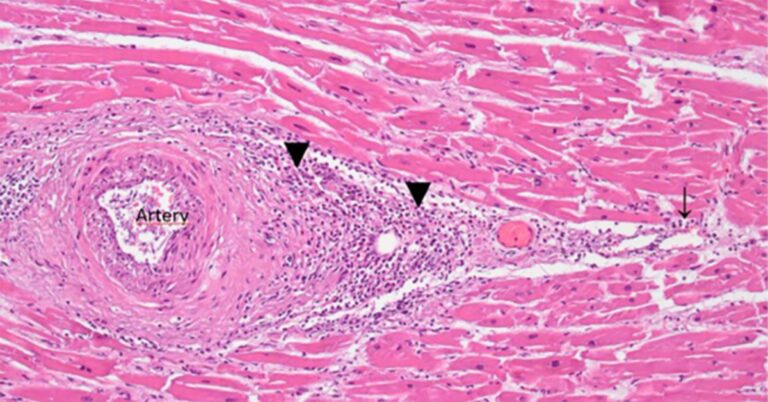Paper Finds Vaccine-Induced Blood Clotting Disorder Also Triggered by Infections, But Not COVID
While the rare blood clotting disorder can occur after both the adenovirus COVID-19 vaccines and adenovirus infections, it is not triggered by COVID-19.
Published in The Epoch Times May 24, 2024 by Marina Zhang
Vaccine-induced thrombotic thrombocytopenia, or VITT, is a type of autoimmune blood clotting disorder that can occur after adenovirus COVID-19 vaccinations. However, researchers recently found that the same pattern of disease can also occur following adenovirus infections.
In a letter to the editor published in the New England Journal of Medicine, researchers wrote that their findings indicate that VITT “is essentially identical to the disorder caused by adenovirus infection that occurs sporadically.”
“Our working hypothesis is that there is a common trigger between adenoviral vaccine and adenovirus infection … that is yet to be identified,” one of the lead authors, Dr. Tom Paul Gordon, professor and head of immunology at Flinders University, told The Epoch Times.
This research will have implications for vaccine improvement, said the lead author of the paper, Jing Jing Wang, a researcher with a doctorate in medical biotechnology, in a press release.
VITT is a rare but severe autoimmune disease that can occur as a side effect of the COVID-19 J&J and AstraZeneca vaccines. Thrombosis with thrombocytopenia is included in J&J’s COVID-19 vaccine package inserts.
The autoimmune disease is caused by anti-platelet factor 4 antibodies or anti-PF4 antibodies. PF4 is a protein released by platelets. Both PF4 and these antibodies occur naturally in the body and help form blood clots.
The antibodies bind to PF4, clumping into blood clots. Platelets also clump into these clots.
Since platelets are needed to stop bleeding, platelet clumping reduces active platelets in the blood, elevating a person’s risk of blood clots and bleeding.
Anti-PF4 blood clotting disorder was named a vaccine-induced disorder because it was primarily linked to the COVID-19 adenovirus vaccines. Before the pandemic, there were no reports of vaccine-induced anti-PF4 disorder.
Same Antibody Fingerprints
Antibodies all have unique binding sites. The binding site is where the antibody attaches to the pathogen, whether it be a virus, bacterium, or parasite.
However, the authors of the letter to the editor found that anti-PF4 antibodies collected from post-vaccine and post-infection patients shared the same structure regarding binding sites.
Dr. Gordon said that both the vaccine and the virus may cause a select group of people to react the same way against PF4.
“Indeed, the pathways of lethal antibody production in these disorders must be virtually identical and have similar genetic risk factors,” he said in the press release.
The authors did not investigate if the few VITT cases reported following COVID-19 mRNA vaccines also had the same anti-PF4 fingerprints.
“Because of their extreme rarity, we have not been able to obtain blood samples from post-mRNA vaccine cases,” Dr. Gordon said.
May Not Be Caused by COVID Spike Protein
The authors’ prior research, published in the journal Blood, followed five unrelated VITT cases and found that COVID-19 and its viral proteins do not contribute to anti-PF4 antibody formation from adenovirus vaccinations.
Since COVID-19 adenovirus vaccines carry DNA for the COVID-19 spike proteins, which are located on the surface of the SARS-CoV-2 virus, it is necessary to investigate whether the anti-PF4 antibodies are made due to antibody activity against the COVID-19 spike proteins.
However, the authors found that anti-PF4 antibodies collected from patients who developed VITT would not interact with COVID-19 spike proteins, suggesting that spike proteins may not have been involved in anti-PF4 formation. Other studies that tested anti-spike antibodies against PF4 also found that spike antibodies would not bind to PF4, possibly indicating no spike involvement.
The authors think that there may be a genetic predisposition that causes some people to develop anti-PF4 blood clotting disorders following vaccinations or infections.
Their 2022 Blood paper found that all five patients investigated carried the same antibody gene variant on their anti-PF4 antibodies.
However, it is still unknown what such findings mean.
No VITT After COVID Infection
While blood clotting and bleeding disorders have also been reported after COVID-19, Dr. Gordon highlighted that the causes and factors involved are different.
There are no cases of anti-PF4 antibodies-driven thrombotic thrombocytopenia after COVID-19 infection, he said.
While the COVID-19 infection can increase one’s risk of blood clot formation, the exact reason is unknown. Some researchers have speculated that the spike protein could drive it. These spike proteins can spontaneously form fibrous, amyloid clots that do not easily break down, even without platelets and other proteins involved in blood clot formation.
There have also been several cases of bleeding disorders, such as immune thrombocytopenia purpura, a type of autoimmune disease that occurs when the body attacks its own platelets. However, the site targeted is different from that of VITT.
Suggest a correction





